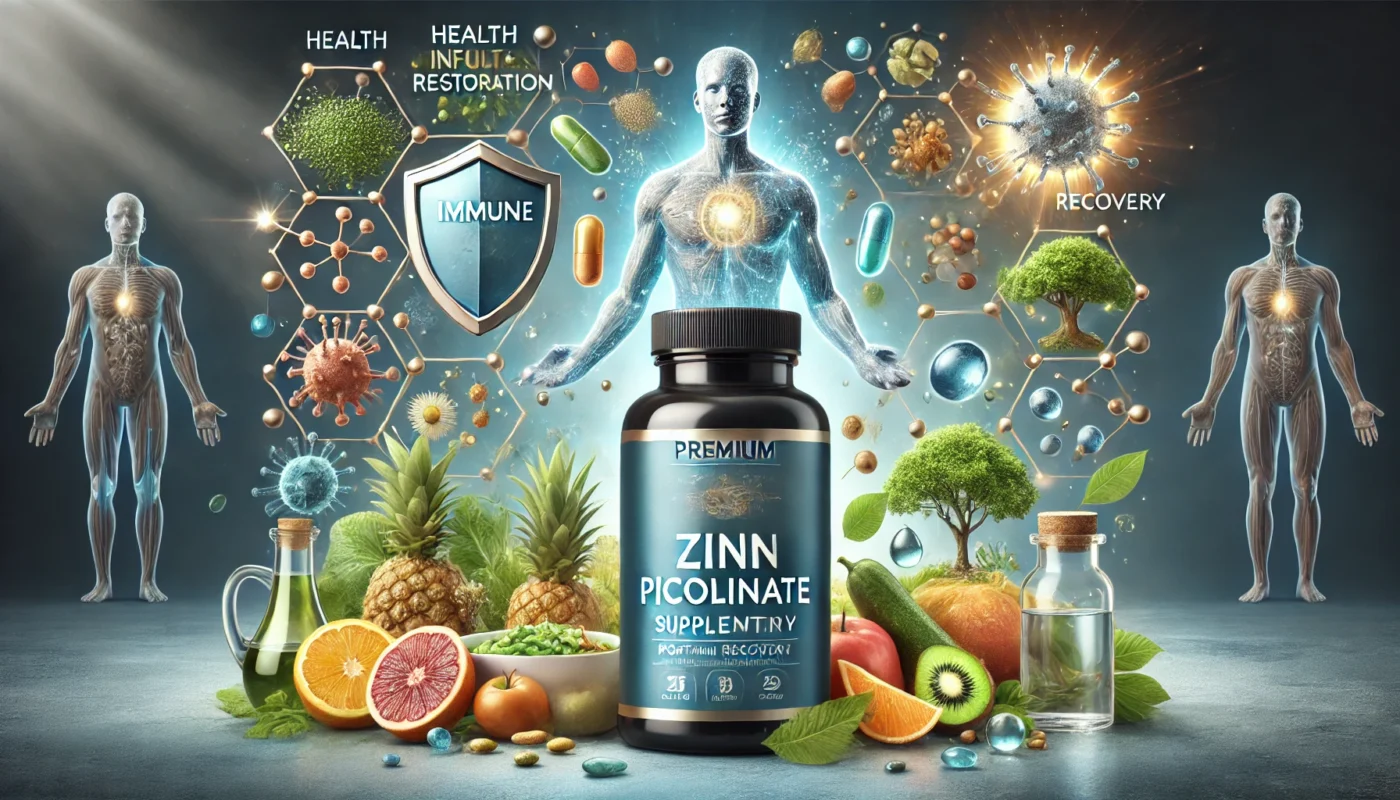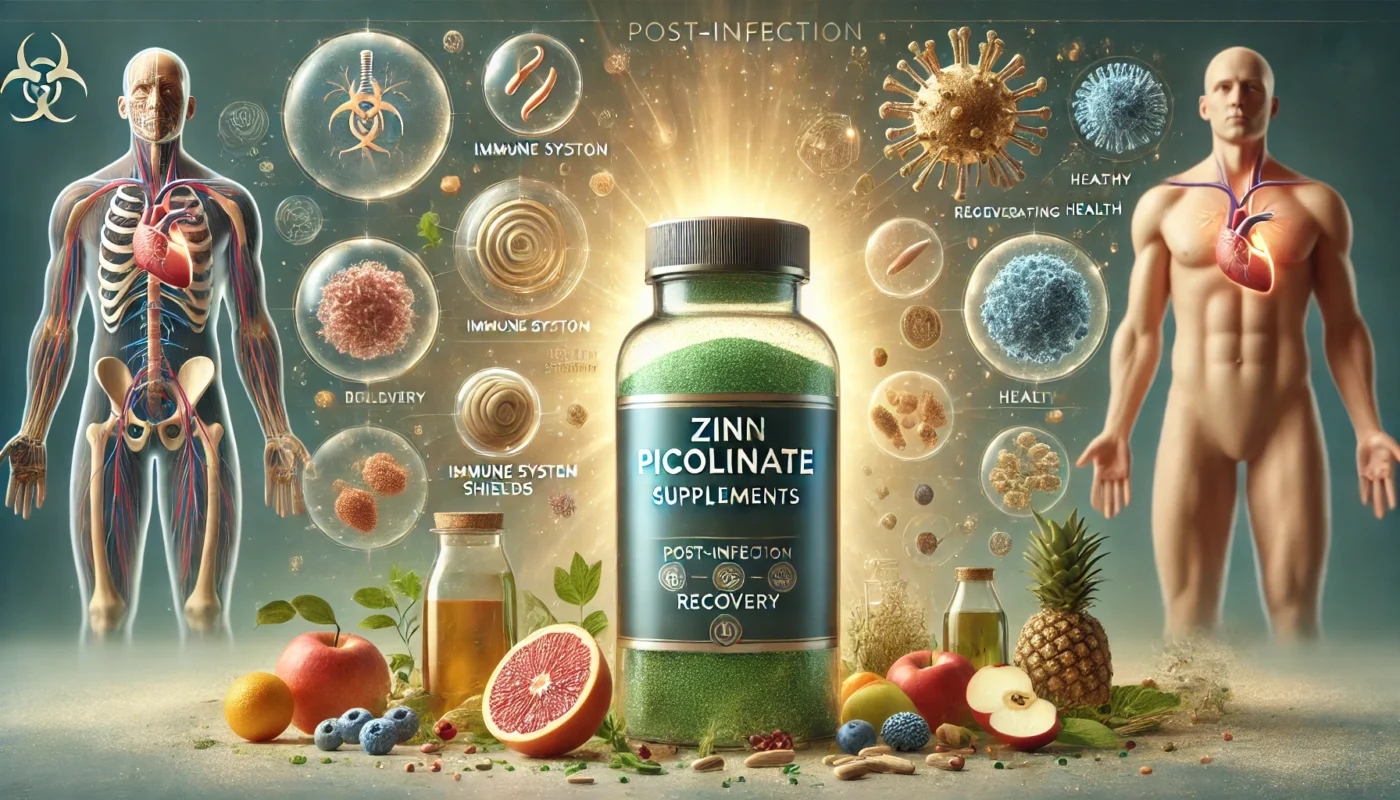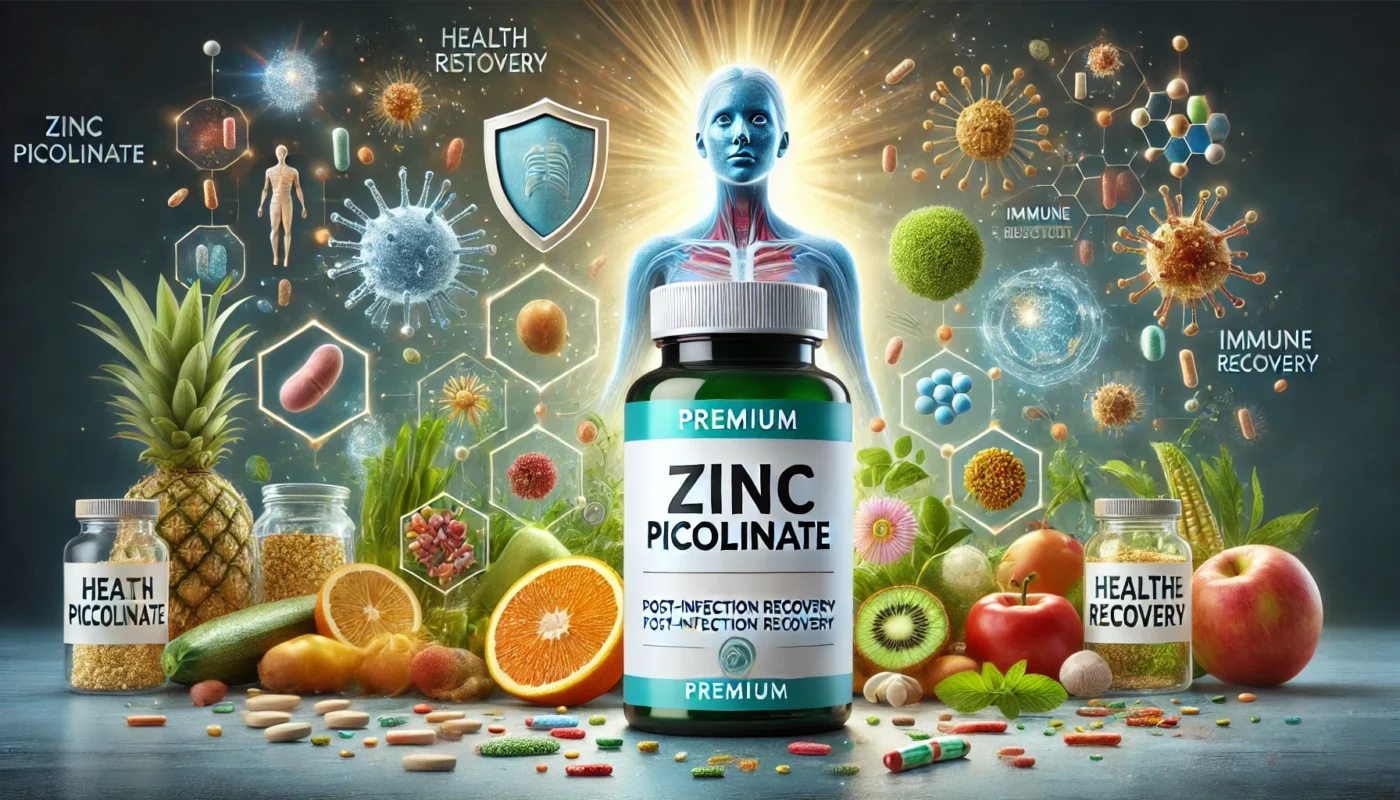Recovering from an illness, whether it’s a respiratory infection, flu, or gastrointestinal virus, can be a slow and challenging process. Post-infection fatigue, lingering inflammation, and weakened immunity are common hurdles that delay a return to normal activities. While rest and hydration remain essential during recovery, certain nutrients play pivotal roles in restoring energy and rebuilding the immune system.
Zinc, a vital trace mineral, is critical for post-infection recovery. Zinc supports cellular repair, reduces inflammation, and strengthens immune defenses, helping the body regain its equilibrium after illness. Zinc picolinate, a highly bioavailable form of zinc, ensures efficient absorption and utilization of this nutrient, making it particularly effective during the recovery phase. This article explores the science behind zinc picolinate’s role in post-infection recovery, backed by clinical studies and practical insights.
You May Also Like?
Zinc Picolinate for Immune Support in Cancer Patients: What Science Says
Zinc Picolinate for Immune Boosting in Chronic Illness: A Natural Approach
The Role of Zinc Picolinate in Post-Infection Recovery is an original (HSLHealing) article.
Understanding Post-Infection Recovery
The recovery phase following an infection is characterized by the body’s efforts to repair damaged tissues, replenish energy reserves, and restore immune function. Common challenges during this phase include:
- Fatigue:
Illness depletes energy reserves, leaving individuals feeling exhausted and weak. - Lingering Inflammation:
Inflammatory responses activated during infection can persist, causing discomfort and delaying recovery. - Weakened Immunity:
The immune system requires time and resources to rebuild after fighting off pathogens. - Nutrient Deficiencies:
Illness often depletes key nutrients, such as zinc, that are crucial for cellular repair and immune health.
Supporting the body with adequate zinc intake can accelerate these recovery processes, promoting faster healing and reducing the risk of secondary infections.
Why Zinc Is Critical for Recovery
Zinc plays a multifaceted role in recovery by supporting processes essential for healing and immunity:
- Cellular Repair and Growth:
Zinc activates enzymes involved in DNA synthesis and protein production, which are critical for repairing tissues damaged during infection. - Immune System Rebuilding:
Zinc supports the proliferation and activation of immune cells, ensuring a rapid recovery of immune defenses. - Reducing Oxidative Stress:
Zinc acts as a cofactor for antioxidant enzymes, neutralizing free radicals generated during infection. - Modulating Inflammation:
Zinc regulates inflammatory cytokines, helping to resolve inflammation and prevent chronic damage. - Restoring Energy Metabolism:
Zinc is essential for ATP production, the energy currency of cells, which aids in overcoming post-infection fatigue.

What Is Zinc Picolinate?
Zinc picolinate is a chelated form of zinc, where zinc is bound to picolinic acid. This form enhances zinc absorption in the gastrointestinal tract, making it one of the most bioavailable and effective zinc supplements available. For individuals recovering from illness, zinc picolinate ensures efficient delivery of zinc to the body’s cells, maximizing its restorative effects.
How Zinc Picolinate Supports Post-Infection Recovery
1. Accelerating Tissue Repair
Infections often damage epithelial tissues in the respiratory, gastrointestinal, or urinary tracts. Zinc picolinate supports the repair of these tissues by promoting cellular proliferation and collagen synthesis.
- Study Insight: Research in American Journal of Clinical Nutrition found that zinc supplementation accelerated wound healing and tissue repair by 20% in patients recovering from viral infections.
2. Boosting Immune Cell Function
After an infection, the immune system needs to replenish its stock of white blood cells, including T-cells and natural killer (NK) cells. Zinc picolinate enhances the production and activity of these cells, ensuring robust immune defenses.
- Clinical Evidence: A study in Journal of Clinical Immunology reported that zinc supplementation increased T-cell proliferation by 30% in individuals recovering from respiratory infections.
3. Reducing Post-Infection Inflammation
Lingering inflammation can prolong recovery and cause symptoms like muscle aches, joint pain, and fatigue. Zinc picolinate helps resolve inflammation by modulating cytokine activity.
- Research Finding: A study in Nutrients found that zinc supplementation reduced levels of pro-inflammatory cytokines, such as interleukin-6 (IL-6) and tumor necrosis factor-alpha (TNF-α), by 25% in post-infection patients.
4. Combating Oxidative Stress
Infections generate reactive oxygen species (ROS), which can damage cells and prolong recovery. Zinc picolinate enhances the activity of antioxidant enzymes like superoxide dismutase (SOD), protecting cells from oxidative damage.
- Evidence: Research in Free Radical Biology and Medicine demonstrated that zinc supplementation increased antioxidant activity by 35%, reducing oxidative stress in individuals recovering from viral infections.
5. Restoring Energy Levels
Fatigue is one of the most common post-infection symptoms, driven by depleted energy reserves and impaired mitochondrial function. Zinc picolinate supports ATP production, restoring cellular energy.
- Study Insight: A study in Biological Trace Element Research found that zinc supplementation improved energy levels and reduced fatigue by 18% in patients recovering from illness.
6. Preventing Secondary Infections
Weakened immunity post-infection increases the risk of secondary infections. Zinc picolinate enhances mucosal immunity and strengthens epithelial barriers, reducing susceptibility to pathogens.
- Clinical Evidence: A study in Respiratory Medicine showed that zinc supplementation reduced the incidence of secondary respiratory infections by 20% in post-infection patients.

Zinc Deficiency and Delayed Recovery
Zinc deficiency is a common issue during and after illness, as infections deplete zinc stores through increased urinary losses and heightened metabolic demands. This deficiency can delay recovery by impairing immune function and cellular repair.
Symptoms of Zinc Deficiency Include:
- Persistent fatigue
- Slow wound healing
- Frequent infections
- Loss of appetite
Statistics:
- A study in The Lancet found that 30% of individuals recovering from respiratory infections had zinc deficiency, correlating with prolonged recovery times and higher rates of complications.
Dietary Sources of Zinc
In addition to supplementation, incorporating zinc-rich foods into the diet can support recovery. Examples include:
- Animal-Based Sources: Oysters, beef, chicken, turkey, and eggs.
- Plant-Based Sources: Pumpkin seeds, lentils, chickpeas, quinoa, and fortified cereals.
For individuals with reduced appetite or dietary restrictions, zinc picolinate provides a reliable and efficient alternative.
Recommended Dosage and Safety
The recommended dietary allowance (RDA) for zinc is:
- Men: 11 mg/day
- Women: 8 mg/day
For post-infection recovery, therapeutic doses of zinc picolinate typically range from 20–30 mg/day. Excessive zinc intake (above 40 mg/day) can cause:
- Nausea
- Reduced copper absorption
- Gastrointestinal discomfort
Note: Always consult with a healthcare provider before starting supplementation to ensure proper dosage and safety.

Integrating Zinc Picolinate into a Recovery Plan
- Take with Meals: Zinc picolinate is best absorbed when taken with food, particularly meals rich in protein.
- Pair with Vitamin C: Combining zinc with vitamin C enhances immune function and accelerates recovery.
- Stay Hydrated: Proper hydration supports cellular repair and nutrient metabolism.
- Monitor Progress: Track improvements in energy levels, immune function, and inflammation after starting supplementation.
Who Can Benefit from Zinc Picolinate for Recovery?
- Individuals Recovering from Respiratory Infections: Zinc picolinate reduces inflammation and enhances immune function.
- Patients with Chronic Illnesses: Zinc supports energy and immune rebuilding in those with long-term health conditions.
- Older Adults: Zinc combats age-related immune decline and accelerates healing.
- Athletes or Active Individuals: Zinc helps restore energy and strength after illness-induced downtime.
Future Research Directions
While current evidence supports zinc picolinate’s role in post-infection recovery, further studies could explore:
- Its long-term effects on immunity and energy restoration.
- Synergistic benefits with other nutrients, such as vitamin D and magnesium.
- Zinc’s role in reducing post-viral syndromes, such as long COVID.
Conclusion: Zinc Picolinate for Faster Recovery
Zinc picolinate offers a scientifically backed, highly bioavailable solution for accelerating recovery after illness. By supporting tissue repair, reducing inflammation, and restoring immune function, zinc picolinate addresses the key challenges of post-infection recovery.
For individuals seeking a natural and effective way to regain their strength and energy, zinc picolinate is a valuable addition to a comprehensive recovery plan. As always, consult with a healthcare provider to tailor supplementation to your specific needs and ensure safe and effective use.

References
- Multiple impacts of zinc on immune function. Retrieved from: https://pubmed.ncbi.nlm.nih.gov/24531756/
- Discovery of Human Zinc Deficiency: Its Impact on Human Health and Disease. Retrieved from: https://pmc.ncbi.nlm.nih.gov/articles/PMC3649098/
- Pubertal arrest due to Zn deficiency: the effect of zinc supplementation. Retrieved from: https://pubmed.ncbi.nlm.nih.gov/17324920/
- Zinc and immune function: the biological basis of altered resistance to infection. Retrieved from: https://pubmed.ncbi.nlm.nih.gov/9701160/
Important Note: The information contained in this article is for general informational purposes only, and should not be construed as health or medical advice, nor is it intended to diagnose, prevent, treat, or cure any disease or health condition. Before embarking on any diet, fitness regimen, or program of nutritional supplementation, it is advisable to consult your healthcare professional in order to determine its safety and probable efficacy in terms of your individual state of health.
Regarding Nutritional Supplements Or Other Non-Prescription Health Products: If any nutritional supplements or other non-prescription health products are mentioned in the foregoing article, any claims or statements made about them have not been evaluated by the U.S. Food and Drug Administration, and such nutritional supplements or other health products are not intended to diagnose, treat, cure, or prevent any disease.

